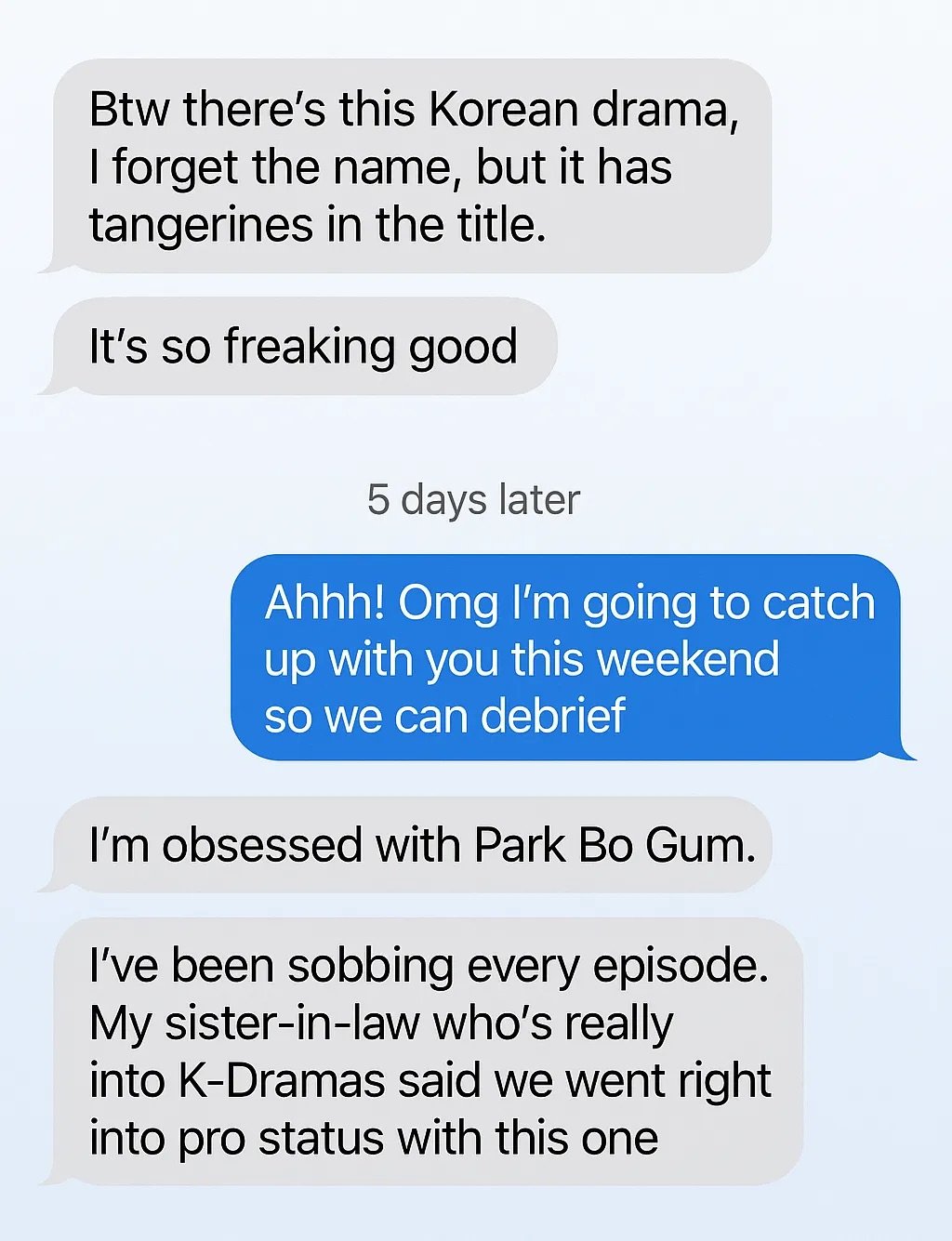Tangerines, Pachinko, and the Lemonade We Make Anyway
If your hobby is also ugly-crying over fictional grannies, welcome 🍊
What I didn’t know at the time was that these texts were the start of me crying for 16 days straight. And listen, I’m no K-drama rookie but OH-MY-GOODNESS, When Life Gives You Tangerines completely wrecked me. Between the sobs and the nose blowing, the emotionally charged show got me spiraling about two things:
even when women have a supportive partner, the systems and societies we live in still make our rise a struggle and;
we are influenced by our ancestors and understanding their story is helpful in understanding who we are.
When Life Gives You Tangerines follows Oh Ae-sun from 1960s Jeju Island to present-day South Korea. Ae-sun spends her life, from childhood to her “winter” years, wanting to become a poet and a teacher. But as an orphan and a woman she meets obstacle after obstacle and it’s not until her seventies that she is able to fully live her dream. Watching Ae-sun’s story unfold brought up the same heartache and frustration I felt while reading Pachinko by Min Jin Lee. Pachinko tells the story of Sunja, from when she was a young woman in 1930s Korea through her senior years in Japan, ending in 1989. Both Ae-sun and Sunja begin as young women with bright futures. Both are pulled off course by unexpected pregnancies and grow into being pillars of their communities and devoted mothers.
In Tangerines, there’s Gwan-sik. In Pachinko, there’s Isak. Both men enter the story as earnest young men who “rescue” unmarried pregnant women and both ultimately die before they’ve lived a full life. Both men are radical in that they support their wives and their ambitions even when those ambitions defy patriarchal norms. They're judged for it, yes, but also respected by their families and communities. At first introduction, I admired these men. They showed up and supported their wives without hesitation or shame and that felt rare, even by today’s standards. But the more I sat with it the more I felt frustrated by how flat their sentiment was. Where was their rage against the injustice? Their quiet resistance is probably more realistic than the setting-fire-to-the-system rage I’m craving, however, did their lack of boldness keep Ae-sun and Sunja from earlier success? What could Ae-sun and Sunja’s timelines have been if they hadn’t been “saved” at all?
If I’m being honest, I’m not sure they ever really needed saving. Both women are entrepreneurial and reinvent themselves repeatedly to ensure their families have security and opportunity. Surprisingly, even with all of their drive their sons, not their daughters, struggle to succeed and to find peace within themselves. While the young men falter, the women in their families don’t just survive — they thrive.
Their sons’ struggles do not sit right with me. I get quite annoyed when I think about them. They are raised by smart and resourceful women, how could they not be inspired? Their mothers didn’t just provide they modeled how to build community, how to love deeply, and how to survive through ingenuity. They gave their sons a roadmap, not for careers, but for living with purpose. And still their sons couldn’t see the gift that was right in front of them.
For me, their son's blindness suggests that representation does matter. Seeing Mae C. Jemison becoming an astronaut matters. Seeing Ilona Maher and her rugby team celebrated for winning a bronze medal at the Olympics matters. When we see others like us living authentically and succeeding it can start a path for us.
Ae-sun and Sunja’s stories also highlight that we all inherit from our ancestors. Whether it's trauma or peace, it leaves a mark. But how much of that light or darkness is inevitable and how much do we choose, shape, or resist? In both stories tragedy rips through these women’s lives. For Ae-sun, whose parents died young, family is something she’s had to build for herself which makes her grip on to her children tight. Sunja is shaped by the colonization of Korea and the early loss of her husband. That loss anchors her in a matriarchal role where survival and caregiving become her life’s focus.
I look at my own life and ask: what have I inherited and of that, what have I kept, and what have I worked hard not to be consumed by? I am fiercely different from the women in my family and yet eerily similar. Both things are true. I’m inspired by the women who came before me: my grandmother, a successful working woman in the 1950s-1980s, and my mother who once she found her voice never let anyone put her in a corner. Still, I find myself struggling against their clouds too. Maybe the key to generational change is recognizing that we are both the legacy and the disruption.
As legacy builders, let's all take a moment to toast the women who’ve made lemonade out of the tangerines they were given. 🍋
